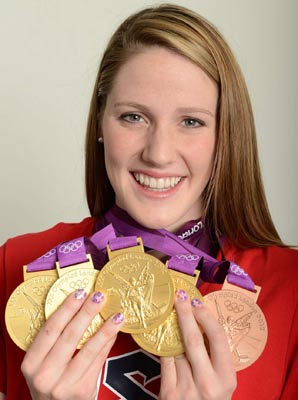Olympic glory doesn't always lead to clear futures for former athletes
Would you like to be Jamaican sprinter Usain Bolt, who can spend the coming years basking in the glow of his unofficial title of the coolest man in track and field while deciding if he's interested in chasing down some new challenges? Or would you prefer to be U.S. gymnast Gabby Douglas, the gold medalist in the women's all-around who's going to get lots of love from the American public, but who might not have any more Olympic glory in her future?
Olympic athletes all come to the Games with different backstories, and they all -- even the stars -- leave with different roads ahead of them. For every gold medalist, shortly after "Congratulations!" comes "What's next?" Sometimes the answer is clear, especially when it's retirement. Although his rival, Ryan Lochte, isn't so sure that Phelps will follow through on his plans to hang up the swim cap for good, Phelps is so at peace with his decision to take his 18 gold medals and walk away as winner that he seems unlikely to change his mind.
You get the feeling that the only time he'll get in a pool from now on will be on an inflatable raft with an umbrella drink in his hand. "I've been able to go to all these amazing cities in my travels and I haven't been able to see them at all," Phelps said. "I see the hotel and I see the pool, that's it. I just want to go and do whatever I want to do."
For new retirees like Phelps and Misty May-Treanor, the women's beach volleyball gold medalist who wants to start a family, the future appears to be comfortable. They will be honored alumni, able to involve themselves in their sport as analysts or counselors to younger athletes to whatever extent they choose, but with the freedom to have more of a life away from their old careers. For athletes who remain in the game, what's coming isn't as clear.
Consider Douglas, who might just be America's favorite teenager at the moment. The obligatory Corn Flakes box with her name on the cover is already on the production line, and companies are queued up to get her signed to endorsement deals. Her future will clearly include a swelling bank account, but what's down the road for her athletically? Female gymnasts peak absurdly young, which is largely why there hasn't been a repeat Olympian on the U.S. women's team since Dominique Dawes and Amy Chow in 2000. The two biggest stars of the 2008 team, Nastia Liukin and Shawn Johnson, both failed to make it back for London.
Douglas will enjoy the affection from America, but she may not be as crazy about the added scrutiny that comes with it. She's already heard silly criticisms about her hair ("I just made history, and people are focused on my hair?" she said) and had to answer questions about her mom, Natalie Hawkins, filing for bankruptcy earlier this year. Heavy stuff for a 16-year-old girl. Will Douglas be able to keep her body and mind in condition to repeat in Rio in 2016? Will she even want to?
Franklin is a year older than Douglas, but swimming promises her more of a future. In a sport in which 45-year-old Dara Torres nearly made the Olympic team, Franklin could amass, dare we say it, Phelpsian medal totals, especially since she won't have the distraction of endorsements right away. She plans to bypass them to maintain her amateur eligibility in order to swim in college. According to Forbes magazine, Franklin could be forgoing as much as $2 million by choosing college over endorsements.
Franklin just wants to keep swimming. How much longer does Bolt want to keep running? After his historic double golds in the 100 and 200 in Beijing and London -- he's the first man to repeat in both races -- it's easy to wonder how long beating the world in those races will hold his interest. What's left for an athlete who believes, as Bolt said after winning the 200 on Thursday, "I am now a legend. I am the greatest athlete to live."?
He has talked about other events, like the long jump or the 400 meters, a distance he has often said he hates. He has ruminated about playing soccer someday. Being so dominant in the present has made Bolt's future uncertain. "Where does he go next, when people start to expect world record after world record?" said Michael Johnson, the great American former sprinter who went double gold in the 200 and 400 meters in the 1996 Olympics. "I remember when I was criticized for not winning a race by enough. You have nowhere to go but down and that's what he's going to find out very quickly. Four years from now, he's going to be a bigger celebrity than he is now. I just don't know if he'll keep going that long."
After winning on Thursday, Bolt seemed to indicate that Johnson might be right. "I think I've had my time. In life, anything is possible but that's going to be a hard reach."
At least Bolt, like most of the Olympic stars, will get to choose where his career goes next. Some aren't as fortunate, like Liu Xiang, the great Chinese hurdler who ruptured an Achilles tendon when he knocked over a hurdle and fell in a 110-meter heat on Tuesday. A spokesman for the Chinese team said Liu, who won the 110-hurdles in the 2004 Games, had no plans to retire. But at 29, with a history of Achilles problems, it seems all but impossible for him to return to Olympic level.
Sometimes it doesn't matter what future you choose. Your future chooses you.





